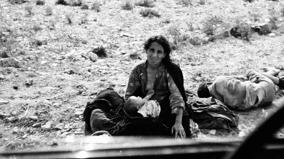New release
Coming
None
Black Sugar
1988
57 min
Leaving soon
This feature documentary offers a shocking look at the living and working conditions of Haitian agricultural laborers in the Dominican Republic. Each year, some 20 000 workers cross the border to cut sugar cane, lured by promises of good money. Instead, they toil up to 14 hours per day and live in unhealthy, cramped camps without running water, electricity, medical or educational facilities.

Details
This feature documentary offers a shocking look at the living and working conditions of Haitian agricultural laborers in the Dominican Republic. Each year, some 20 000 workers cross the border to cut sugar cane, lured by promises of good money. Instead, they toil up to 14 hours per day and live in unhealthy, cramped camps without running water, electricity, medical or educational facilities.
-
directorMichel Régnier
-
scriptMichel Régnier
-
photographyMichel Régnier
-
editingMichel Régnier
-
executive producerÉric Michel
-
soundCatherine Van Der Donckt
-
sound editingGilles Quintal
-
re-recordingHans Peter Strobl
-
narratorGretta Chambers
-
musicAlexandre Clautaire
Education
Ages 14 to 16
School subjects
The teacher can ask students to do research to follow up on the situation of Haitian workers in the Dominican Republic. In-depth research should be suggested, since this film dates from 1987. It may be interesting to find out the current living conditions of these workers. Have they improved? Deteriorated? Have the governments of Haiti and the Dominican Republic resolved the situation?

















